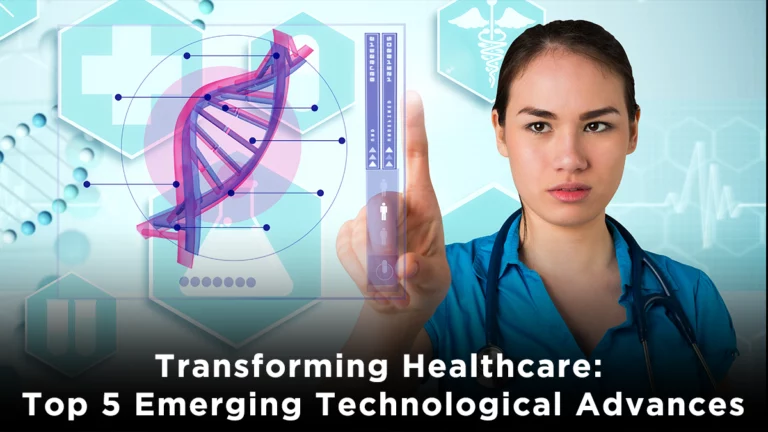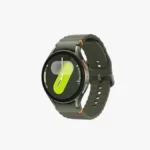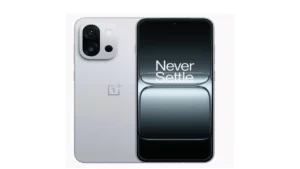The healthcare industry is experiencing a wave of transformative technological advancements that are poised to revolutionize patient care and improve outcomes. Artificial Intelligence (AI), Virtual Reality (VR), blockchain, and other cutting-edge technologies are gaining traction and reshaping the healthcare landscape. In this blog, we will examine the top five technological advances in healthcare and discuss their potential impact on patients, healthcare providers, and the overall industry.
-
AI Health Coach
AI health coaches are virtual assistants powered by AI and ML algorithms. These coaches provide personalized health advice and support, helping individuals achieve their health goals. They employ natural language processing (NLP) to engage with users via chatbots, voice assistants, or mobile applications, facilitating personalized interactions and support. These virtual assistants offer cost-effective solutions for personalized healthcare services, particularly for remote or underserved areas. They can reduce the workload of healthcare professionals and provide customized advice based on vast amounts of health-related data. AI health coaches have the potential to improve health outcomes, detect early warning signs of chronic conditions, and alleviate the burden on the healthcare system.
-
Metaverse
The metaverse, popularized by Meta (formerly Facebook), presents numerous possibilities for advanced care delivery in healthcare. With AI-powered simulations in Virtual Reality (VR) scenarios, medical practitioners can explore new surgical methods and test pharmaceutical drugs. Through VR avatars created from extensive 3D patient analysis, healthcare professionals can virtually examine patients and collaborate globally, transcending geographical limitations. Augmented Reality (AR) settings and Robotic Process Automation (RPA)-driven surgeries are already transforming HealthTech. VR also aids patients in post-surgical rehabilitation by mimicking physical movements and stimulating their nervous systems. The metaverse opens up a world of innovative healthcare possibilities and enhances medical workflows, improving patient care and reducing errors.
-
Blockchain Opportunities
Blockchain holds significant promise in healthcare, primarily in secure and efficient Health Information Exchange (HIE). By leveraging blockchain technology, patients can control their medical records and grant access to healthcare providers while ensuring data privacy and security. Blockchain can streamline clinical trials, track the pharmaceutical supply chain, prevent health insurance claims fraud, and facilitate secure telemedicine transactions. Through blockchain, healthcare data can be shared transparently, improving interoperability among data silos and independent systems. The application of blockchain in healthcare can potentially enhance data security, patient privacy, and the overall efficiency of healthcare processes.
-
Healthcare-Specific Cloud Services
Tailored cloud services designed explicitly for healthcare organizations, such as Microsoft Cloud for Healthcare, offer significant advantages. These services enable secure storage and management of vast amounts of patient data, facilitating access for certified healthcare providers from anywhere. Cloud services also promote data sharing among different providers, enhancing care continuity and reducing errors. Furthermore, cloud services empower the development of innovative healthcare applications, telemedicine services, and personalized medicine, resulting in increased access to care, improved patient engagement, and enhanced clinical decision-making. Machine learning algorithms can analyze large datasets, supporting clinical research and population health management.
Enhancing Clinician Wellness: Tools for Empowering Healthcare Professionals
- Clinical automation: Alleviates administrative burden and improves clinician wellness by reducing tasks associated with documentation, medication management, and routine tasks.
- Clinician wellness apps: Provide resources such as meditation exercises, stress-management techniques, and self-care tips to support the mental and physical health of caregivers.
- Benefits of clinician wellness apps: Enhance job satisfaction, reduce burnout, and improve the overall well-being of clinicians.
- Impact on patient care: Improved clinician wellness translates into better patient care and outcomes.
At Tech Upside, we are committed to staying at the forefront of these technological advances and providing insights into their potential implications for the healthcare industry. Our mission is to empower healthcare providers, patients, and stakeholders with the knowledge and tools they need to navigate the ever-evolving landscape of healthcare technology. Visit us to stay updated on the latest developments in how technology is shaping the future of healthcare.
Read more: Health Technology News Today

















